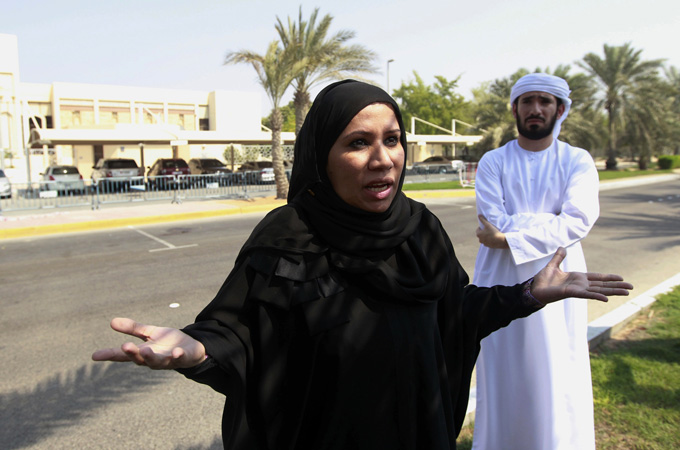By Adom M. Cooper
Impunity Watch Reporter, Middle East
ABU DHABI, United Arab Emirates–Five activists who were jailed seven months ago for “publicly insulting” United Arab Emirates officials plan to begin a hunger on Sunday 13 November 2011. According to Human Rights Watch, the activists will let the strike continue until the authorities release them unconditionally and cease all judicial proceedings against them.

The five activists, who were arrested earlier this year in April and whose trial opened on June 14, are: Ahmed Mansoor, an engineer and blogger; Nasser bin Ghaith, an economist, university lecturer at Sorbonne Abu Dhabi, and an advocate for political reform; and online activists Fahad Salim Dalk, Ahmed Abdul-Khaleq, and Hassan Ali al-Khamis.
The charges against the activists are under Article 176 of the Penal Code, which deems it a crime to publicly insult top officials. The charges stem from the usage of the banned online political forum known as UAE Hewar. According to Human Rights Watch, a review of the messages posted by these activists did no more than criticize government policy or political leaders. No evidence exists that shows the activists used or incited violence in the course of their political activities.
Article 176 permits a sentence of up to five years in prison for “whoever publicly insults the State President, its flag or national emblem.” Article 8 broadens the application of the provision to encompass the vice president, members of the Supreme Council of the Federation, and others.
On Friday 11 November 2011, the activists released a joint statement, declaring their intention to begin the hunger strike. Also, they detailed violations of their basic rights by judiciary, prosecution, and prison officials, including their prolonged detention on politically motivated charges and an unfair trial. According to Human Rights Watch, the five activists felt “compelled” to go on a hunger strike after suffering in prison for seven months and having “exhausted all possible means of redress.”
The statement also detailed how the activists have endured a “vicious, orchestrated smear campaign” through text messages, social media, and satellite channels since their detention. Their lawyers have made numerous criminal complaints to officials, including the attorney general, public prosecutors, and police officers. These complaints have been ignored. Government authorities have reportedly also failed to investigate threats, including death threats, against the activists.
“The pressure and mobilization of public opinion to ensure our conviction for a crime that we have not been proven to have committed-all of this has stifled public liberties in general, and particularly freedom of opinion and expression, in our dear country to which we pledge our exclusive allegiance.”
On Sunday 13 November 2011, Weded al-Muhairi, the wife of Nasser bin Gaith, shared these sentiments with Al-Jazeera.
“They began a hunger strike to get their voices through to UAE President Sheikh Khalifa bin Zayed Al Nahyan, and not to challenge the authorities. The decision came after all our efforts have been thwarted, after we have knocked on every door and exhausted all possible means of redress, after we have lost all hope of a fair trial and even civilized, humane treatment.”
Joe Stork, Deputy Middle East Director at Human Rights Watch, shared these words about the developing situation.
“Every month that these men remain locked up on absurd charges of insulting UAE rulers further undermines the government’s claim that this is an open and tolerant country. This trial is all about zero tolerance for political dissent and has nothing to do with justice or security.”
Under UAE’s Constitution as well as international human rights law, the prosecution of the five activists violates guarantees of free speech. The Federal Supreme Court is trying the case and has stated that it will issue a verdict on 27 November 2011.
The court has not allow the defendants to review the evidence, not allowed them to review the charges against them, and not allowed the defense lawyers to cross-examine one prosecution witness and did not provide sufficient time to cross-examine others. Without any sort of explanation, the authorities closed the first four hearings to the public, journalists, international observers, and the families of the accused activists.
According to Human Rights Watch, on several occasions, the court has denied or even failed to rule on motions to release the defendants on bail, even though none of them are charged with a violent offense. The authorities have not suggested once that the activists are potential flight risks.
Article 32 of The Arab Charter on Human Rights guarantees the right to freedom of opinion and expression, and to impart news to others by any means. The United Arab Emirates has ratified this charter, submitting itself to the rights listed therein. The only restrictions the charter allows on the practice of this right are those imposed for “respect for the rights of others, their reputation, or the protection of national security, public order, public health, or public morals.”
With the progress of the Federal Supreme Court thus far, one can only hope that its expected verdict on 27 November 2011 recognizes that the five activists have done nothing listed under Article 32’s exceptions, as reflected by the current evidence available.
For more information, please see:
Al-Jazeera – Jailed UAE Activists Begin Hunger Strike – 13 November 2011
Human Rights Watch – UAE: Activists Planning Hunger Strike – 11 November 2011
Financial Times – UAE Democracy Activists Plan Hunger Strike – 11 November 2011
Press TV – UAE Prisoners To Go On Hunger Strike – 11 November 2011
Amnesty International – UAE: Trial Observer Finds Flagrant Flaws in ‘UAE 5’ – 2 November 2011